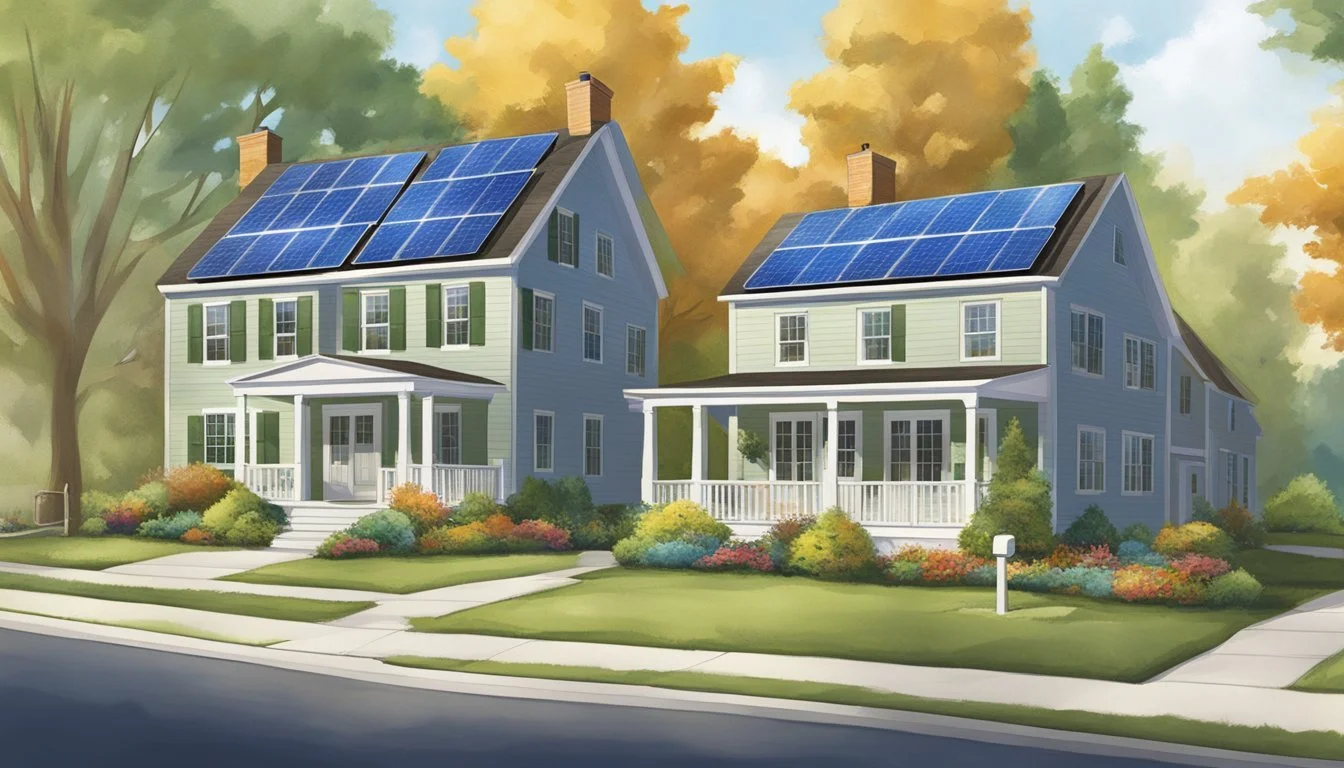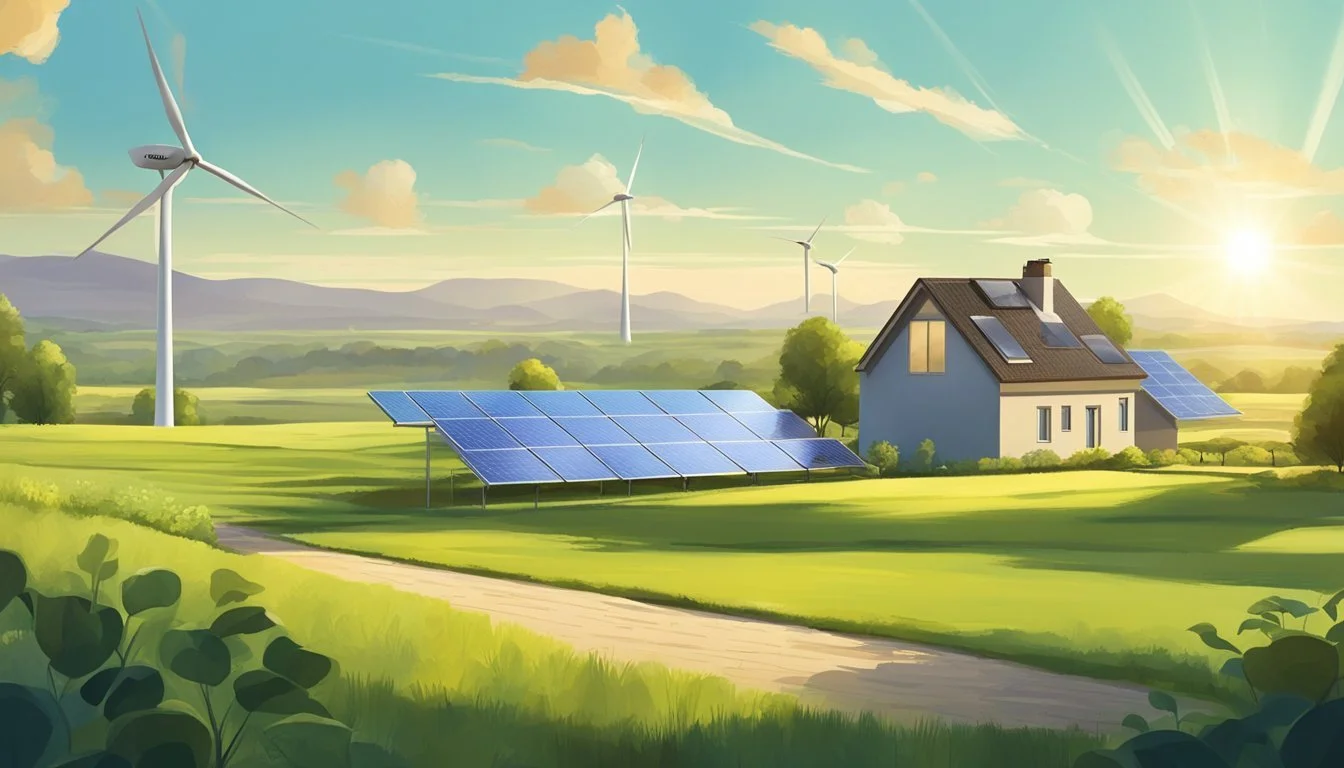Incentives for Renewable Energy and Conservation in Delaware
A Guide to Current Programs and Benefits
Delaware demonstrates a strong commitment to expanding its renewable energy sector by offering various incentives and grants to both homeowners and businesses. These financial incentives aim to encourage the adoption of renewable energy sources, such as solar and wind power, as part of the state's strategy to foster sustainable energy practices and reduce greenhouse gas emissions. The Delaware Department of Natural Resources and Environmental Control (DNREC) facilitates these efforts through programs and funding opportunities designed to make clean energy more accessible and affordable.
State-wide initiatives, some of which are articulated within the DNREC's Green Energy Program, enable Delaware residents and businesses to tap into a range of incentives. These incentives are structured to support the initial investment in renewable energy systems, thereby accelerating the return on investment and promoting long-term energy savings. Moreover, the state's collaboration with major electric utilities ensures that renewable energy integration aligns with broader energy infrastructure planning and grid modernization efforts.
Technical guidance and support are also part and parcel of the services Delaware offers to its citizens, further underscoring the state's proactive stance on energy conservation and sustainability. The Delaware Energy Act guides these sustainable practices, dictating policy implementation with the aim of enhancing the state's overall energy system. This encompasses actions focused on comprehensive state energy planning and improvements that prioritize efficiency and the well-being of future generations. Through these concerted efforts, Delaware continues to chart a path forward in renewable energy adoption and conservation measures, setting a robust example for states nationwide.
Overview of Delaware's Renewable Energy Landscape
In response to mounting environmental concerns and the need for sustainable energy practices, Delaware has taken definitive steps toward embracing renewable energy solutions. This section provides a detailed look at the state's legislative framework, the variety of renewable energy sources being utilized, and the committees driving these initiatives forward.
State Law and Renewable Portfolio Standard
Under Delaware's Renewable Portfolio Standard (RPS), electricity suppliers are mandated to ensure that a specified percentage of the power they provide to consumers comes from renewable sources. This policy is pivotal in guiding the state's energy transition, aiming to both mitigate climate change and promote a secure, sustainable energy supply. The RPS includes multiple tiers, with Tier 1 targeting new renewable sources and Tier 2 including solar and other distributed generation technologies.
Renewable Energy Sources in Delaware
Delaware harnesses a range of renewable energy sources, with solar power being a prominent player in its green portfolio due to the state's supportive solar policies. Alongside solar, wind energy and biomass also contribute to the energy mix, reinforcing Delaware's commitment to diversity in renewable energy sourcing.
Role of the Delaware Energy Efficiency Advisory Council
The Delaware Energy Efficiency Advisory Council operates within this structure, advising on energy-saving measures and practices. This council is integral in identifying opportunities for energy conservation and in assisting the development of strategies to meet or exceed the goals set by the RPS. They engage with various stakeholders to enhance the adoption of energy-efficient technologies throughout the state.
Through these systematic efforts, Delaware strives to become a leader in renewable energy and conservation, setting a standard for other states to follow.
Incentive Programs for Renewable Energy
Delaware offers several incentive programs aimed at encouraging the adoption of renewable energy sources. These programs focus on providing financial benefits such as rebates and credits to support both homeowners and businesses in their transition to greener energy solutions.
Green Energy Program and Rebates
The Green Energy Program in Delaware provides rebates to residential and commercial property owners who install renewable energy systems. Solar, wind, geothermal, and certain biomass systems are all eligible for these rebates. The program is designed to lower the upfront costs associated with the purchase and installation of these technologies.
Residential Rebates: Homeowners may receive rebates that cover a portion of the installation cost, effectively reducing the initial investment required for green energy systems.
Commercial Rebates: Businesses can also take advantage of similar rebates, which support the deployment of larger-scale renewable energy projects.
Solar Renewable Energy Credits (SREC) and Net Metering
Delaware's approach to promoting solar energy includes SREC initiatives and net metering policies. Solar Renewable Energy Credits create a market for solar energy, offering a financial incentive for energy produced by solar installations.
SRECs: For each megawatt-hour (MWh) of solar electricity a system generates, the owner earns one SREC which can then be sold to utility companies to help them meet state renewable energy standards.
Net Metering: This allows for the measurement of energy that a renewable system produces in excess of the owner's use. Excess energy flows back to the grid, and the owner receives a credit, offsetting the cost of power drawn from the utility at other times.
Through these monetary incentives, the state of Delaware actively promotes the expansion of renewable energy infrastructure and aims to make sustainable energy options more accessible to its residents and businesses.
Financial Incentives for Homeowners and Residential Projects
In Delaware, homeowners can benefit from a variety of financial incentives aimed at promoting renewable energy and energy efficiency. These incentives include grants, tax credits, and specialized programs to support the adoption of solar and geothermal energy, as well as improve home energy efficiency.
Grants for Solar and Geothermal Systems
Homeowners in Delaware have access to grants that significantly offset the costs of installing solar and geothermal energy systems. The Delaware Energy Program provides grants for solar photovoltaic, solar hot water, and geothermal heat pump installations. These grants aim to encourage the adoption of clean energy by reducing upfront costs.
Solar Photovoltaic (PV) Systems: Grants up to $0.70 per Watt for residential installations with a cap depending on system size.
Solar Water Heating Systems: Grants at 30% of the system cost, capped at certain limits.
Geothermal Heat Pumps: Fixed grant amounts based on tonnage of the system installed.
Weatherization Assistance Program and Tax Credits
The Weatherization Assistance Program (WAP) is designed to help low-income households increase energy efficiency and reduce their energy bills through improvements such as insulation, air-sealing, and HVAC upgrades. This program is coupled with tax credits to incentivize energy conservation.
Tax Credits: Available for energy efficiency improvements like new insulation, window upgrades, and more efficient doors.
Efficiency Improvements: May result in a tax credit of up to 30% of the cost with a maximum of $1,500.
Incentives for Low- to Moderate-Income Households
Delaware extends its commitment to energy efficiency and renewable energy to low- to moderate-income households through tailored incentive programs. These are designed to remove financial barriers that may prevent these households from making energy-efficient upgrades.
Income-Based Grants: Offer higher incentives for solar installations to qualifying low- to moderate-income homeowners.
Weatherization Services: Free to eligible households, improving energy consumption and ensuring homes are more comfortable year-round.
These financial incentives not only help homeowners save on energy costs but also contribute to the state’s environmental goals by encouraging the use of renewable resources and promoting energy conservation measures.
Commercial and Industrial Renewable Energy Solutions
In Delaware, businesses and industrial entities are increasingly adopting renewable energy systems, prompted by the availability of grants and the benefit of getting technical guidance for their energy projects. These moves not only contribute to sustainability but also to the state's economic growth by creating jobs in the renewable sector, especially within the solar industry.
Renewable Energy Systems for Businesses
Businesses in Delaware have multiple options when considering the installation of renewable energy systems. Options such as solar panels, wind turbines, and geothermal systems are becoming more prevalent. These systems contribute to a reduction in operational costs over time and demonstrate a commitment to environmental responsibility. The solar industry, in particular, is witnessing a significant boost, creating jobs and cultivating a reputation for innovation within Delaware's commercial sector.
State and Federal Grant Funding Opportunities
State-Level Incentives: Delaware provides several grant funding opportunities for businesses looking to invest in renewable energy. The Green Energy Fund Grants, for example, provide financial assistance for solar photovoltaic, solar thermal, geothermal, wind, and ocean wave energy technologies.
Federal-Level Incentives: The Investment Tax Credit (ITC) is a federal incentive allowing businesses to deduct a portion of their renewable energy investments from their taxes.
Eligible entities are encouraged to take advantage of these financing solutions to make the transition to renewable energy more economically feasible.
Technical Guidance and Data for Energy Projects
To ensure the successful implementation of renewable energy projects, Delaware offers technical guidance and access to important data. Detailed analyses and reports are made available to businesses to help them understand energy consumption patterns and the potential returns on investment. Resources such as the Database of State Incentives for Renewables & Efficiency provide comprehensive information on policies that support renewable energy adoption. To further bolster these efforts, partnerships with local universities and research institutions offer additional expertise and support.
Renewable Energy and Environmental Conservation
Delaware's strategic approach to harnessing renewable energy sources directly contributes to climate change mitigation by reducing greenhouse gas emissions. Various conservation programs complement these efforts, engaging communities in environmental stewardship.
Impact of Renewable Sources on Climate Change
Renewable energy sources like solar and wind are pivotal in Delaware's battle against climate change. They provide alternatives to fossil fuel consumption, thereby decreasing the state's carbon footprint. The shift to renewables is a strategic response to climate change impacts, reducing the reliance on energy sources that emit harmful gases.
Energy Efficiency and Reduction of Greenhouse Gases
Advancements in energy efficiency play a crucial role in Delaware's environmental strategy. By improving efficiency standards for buildings and promoting energy-saving technologies, the state actively curtails its greenhouse gas emissions. These measures contribute not only to lower energy consumption but also to long-term environmental health.
Conservation Programs and Community Initiatives
Delaware has implemented several conservation programs that encourage public participation and education on environmental issues. These community-based initiatives aim to foster a collective responsibility towards local ecosystems, promoting actions that lead to energy efficiency and greenhouse gas reduction. Effective conservation practices help sustain the state's natural heritage for future generations.
Solar Energy Focus in Delaware
Delaware is actively promoting solar energy as part of its strategy to transition to renewable sources. The state offers incentives for solar panel installations and constantly works to support the solar industry and facilitate solar capacity growth.
Solar Panel Installation and Cost
Solar panel installation in Delaware is a worthwhile investment for homeowners and businesses due to various incentives and tax credits. The cost of solar panels has decreased substantially, while efficiency and technology have seen significant improvements, meaning better output per square foot. Solar panels function by converting sunlight into electricity, with photovoltaic cells being the crucial technology that makes this possible. In Delaware, homeowners can benefit from programs like the Solar Renewable Energy Credits offered by Energize Delaware, which offsets the costs of solar installation by allowing solar producers to earn credits for the energy they generate.
Support for the Solar Industry and Solar Capacity Growth
To bolster the solar industry, Delaware has implemented policies that require electricity suppliers to procure a certain percentage of their electricity from solar generators. This has led to a healthy market for solar renewable energy credits and provided a stable environment for solar companies to thrive. The state has evidenced a steady growth in solar capacity, indicating a strong commitment both to sustainability and to paving the way for a robust renewable energy future. Moreover, Delaware's net metering policy allows individuals who generate solar electricity to receive credits on their utility bills, further encouraging the addition of new solar capacity and making investment in solar more attractive to residential and commercial users.
Utilities and Energy Providers in Delaware
Delaware's energy landscape is defined by a mix of utilities that supply electricity to residents and businesses, with rates and renewable energy options varying across the state. The energy market includes the traditional utility providers, renewable energy incentives, and trading mechanisms designed to support the growth of clean energy.
Providers and Energy Rates
Delaware Electric Cooperative and Delmarva Power are the primary utilities responsible for electricity distribution in the state. Electricity rates in Delaware are typically expressed in cents per kilowatt-hour (kWh) and can fluctuate, influenced by factors such as fuel costs, energy demand, and regulations. The rates are set to reflect not just the cost of electricity but also the costs associated with transmission and distribution.
Delaware Electric Cooperative
Member-owned utility
Offers competitive electricity rates
Delmarva Power
Major utility provider
Provides electric bill assistance programs
The Role of Delmarva Power
Delmarva Power, a major player in Delaware's energy provision, serves a significant number of customers in the state. They are instrumental not only in supplying electricity but also in facilitating programs related to energy conservation and renewable energy. Delmarva Power offers various programs and tools that help customers manage their energy use and expenditures, thus playing an essential role in the state’s move toward a sustainable future.
Energy Efficiency Programs
Designed to reduce consumption
Helps lower overall electricity costs for consumers
Renewable Energy Trading Mechanisms
Delaware has established renewable energy trading mechanisms, such as Solar Renewable Energy Credits (SRECs), which incentivize the production of solar power. Through these mechanisms, utility companies like Delmarva Power and entities such as the Delaware Electric Cooperative can meet state-mandated renewable energy goals. SRECs and similar trades not only encourage the expansion of solar energy but also create an ancillary market that contributes to the overall energy economy.
SRECs
Tradable credits representing the generation of one megawatt-hour (MWh) of solar electricity
Provide additional income streams for solar panel owners
Technological Advancements and Future Prospects
Delaware is witnessing significant strides in renewable energy tech, with a strong emphasis on the integration and enhancement of photovoltaic, geothermal solutions, and the expansion of the electric vehicles market. Small-scale renewable installations are also gaining traction, encouraging the adoption of greener alternatives statewide.
Advances in Photovoltaic and Geothermal Technologies
Photovoltaic (PV) systems in Delaware have seen notable efficiency improvements due to innovative materials and smarter design architectures. Manufacturers are now harnessing advanced semiconductor technologies, which allow solar panels to convert sunlight to electricity with greater efficacy. Geothermal energy, with its minimal carbon footprint, has grown in the state through the use of enhanced geothermal systems (EGS) that exploit the Earth's heat more effectively than traditional methods.
Growth of Electric Vehicles Market
Delaware's electric vehicle (EV) sector is on the rise thanks to increased battery performance and more cost-effective production techniques. The state is facilitating this growth by investing in charging infrastructure and offering incentives for EV purchases. This bolsters consumer confidence in alternative fuel vehicles as a viable technology for a greener future.
The Influence of Small Scale Renewable Installations
The influence of small-scale renewable energy installations, such as residential solar panels and home geothermal systems, has burgeoned. These decentralized solutions not only provide energy independence but also contribute to the state's overall renewable energy goals. By offering rebates and tax credits, Delaware supports homeowners and businesses in adopting these cleaner energy technologies, effectively paving the way for a more sustainable energy landscape.
Policies Affecting Renewable Energy Expansion
In Delaware, the expansion of renewable energy is driven by various policies that stimulate investment, promote clean energy services, and aim to save money for consumers in the long term. Noteworthy efforts include legislative measures and the advocacy of organizations like the Delaware Solar Energy Coalition.
The Delaware Solar Energy Coalition's Advocacy
The Delaware Solar Energy Coalition actively promotes policies that support solar energy expansion. They work to inform the legislature and the public about the benefits of solar power, advocating for incentives that make solar installation more affordable and accessible to a broader range of consumers.
Legislation on Clean Energy and Transportation
Recent legislation in Delaware reflects a strong commitment to clean energy and a cleaner transportation sector. The state's legislature has passed laws that incentivize the adoption of renewable energy sources, aiming to reduce reliance on fossil fuels and mitigate environmental impact. This includes support for electric vehicles and related infrastructure to foster a shift towards a more sustainable transportation ecosystem.
Future Directions in Delaware's Energy Policy
Looking ahead, Delaware's energy policy is poised to continue its trajectory towards greater sustainability. The state is expected to unveil new initiatives and revisions to existing policies to further support the growth of clean energy, ultimately helping consumers save money and promoting a healthier environment.








